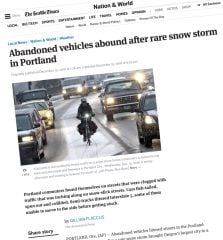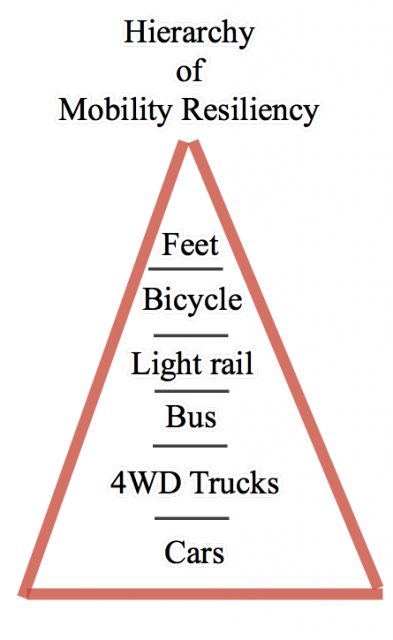
Welcome to the morning after.
After a few inches of snow fell on Wednesday afternoon, our region’s transportation system ground to a halt. Major freeways, arterials, and even many neighborhood streets were either completely gridlocked or impassable due to abandoned cars left in scrap heaps of twisted metal and broken dreams. Thousands of people were stranded for hours and backups continued on Highway 26 until midnight (midnight!). Thanks to an Associated Press story, the insanity of it all has brought us national attention.
Now we’ve entered the autopsy stage where everyone is trying to figure out how it happened.
The Oregonian broke it down to five reasons: We don’t use salt on our roads; people don’t carry chains; people don’t know how to drive in the snow; Portland doesn’t have enough snow plows, and transit is, “not equipped for hilly Portland.”
Sigh. Of course they forgot to mention something.
Here’s the inconvenient truth: Our over-reliance on single-occupancy motor vehicle use has real consequences. It leads to lots of injuries and deaths, it poisons our lungs, and it makes our transportation system extremely fragile and inefficient.
Advertisement
And let’s not act like what happened last night was a big surprise. Twice a day every weekday we see another example of this. It’s called rush-hour. You know that thing everyone has been complaining about because it keeps getting worse every year? Despite many billions of dollars invested in our roads to facilitate auto use, just one fender-bender on a busy freeway can cause massive backups. Add in rain and it gets even worse. The Oregon State Police even has to issue a traffic alert for I-5 when there’s a big football game or a busy shopping day.
It’s not a bug, it’s a feature.
This lack of resiliency in our transportation system happens by design. Elected officials, interest groups and road agencies throughout the region and state prioritize single-occupancy motor vehicle travel far ahead of every other mode. The result is a system prone to choking. A system where other, much more efficient and resilient modes, can’t breathe.
Yesterday our social media timelines were full of misery from people in cars and sheer joy from people on bikes. It was a striking contrast.
This morning we’ve read many Tweets from people opting to ride bikes or take transit instead of their cars. If only more people were able and willing to do that yesterday we might have avoided this mess.
— Jonathan Maus, (503) 706-8804 – jonathan@bikeportland.org
BikePortland is supported by the community (that means you!). Please become a subscriber or make a donation today.


